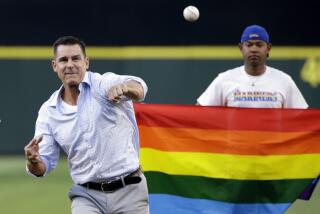Bret Boone Aims to Carry On Tradition
PEORIA, Ariz. — For Bret Boone, it should have been the best of times.
It was mid-August of 1992. The major league baseball season had 1 1/2 months to go. Boone, at 23, and with not yet three full seasons of professional experience, had been promoted from Calgary and inserted into the Seattle Mariner lineup at second base, replacing the veteran Harold Reynolds.
In doing so, Boone had become part of the first three-generation family in major league history. He had looked forward to playing in the big leagues for a long time, and now he was here, just like his grandfather Ray and his father Bob before him.
Ever since he was a tyke, Bret had been in major league clubhouses, so he wasn’t awed by that specter. Nor did being in the presence of major league players overwhelm him.
POne thing was new to him, however. He had never faced major league pitching.
“Last year was rough,” Boone said at the Mariners’ spring training camp. “There were times in that 1 1/2 months I was going nuts, but that’s part of it. It’s a learning process.”
He learned what it’s like to play in front of crowds of 50,000. He learned what it’s like to play with and against great players he’d only read about or seen on TV. He learned what it’s like to cross several time zones and play a game the next day. He learned what it’s like to replace a fan favorite and get booed. But most of all, he learned what it’s like to fail, both as a player and as a team.
“It was tough when we lost 14 games in a row,” he said. “We’d been out of the race for a long time, no one wanted to be there and I was struggling.”
To put it mildly, he struggled. After batting .314 for Calgary and being named the Pacific Coast League’s All-Star second baseman, Boone hit .194 for the Mariners. When he made contact, he showed some power, collecting eight extra-base hits, including four home runs, but too often he didn’t make contact. He struck out 34 times in 129 at-bats.
“People wanted to jump on me because I was swinging too hard,” Boone said. “Well, if they’d watched me a month earlier in the minor leagues, that’s the way I batted. I’m gonna swing hard. That’s the way I’ve always had success and I’m not gonna change that.
“I wanted to show everybody how good I was every at-bat and you can’t approach it like that,” Boone said. “You’ve got to stay within yourself and do what you can do.”
Boone was so eager to do well that he was unable to relax when he went to the plate for the first two weeks. It wasn’t until about the last 10 days of the season that he started to feel comfortable.
“It just takes time to adjust,” he said. “There are only so many Juniors (Griffey) who are able to turn it on from Day One.”
If Boone had stepped into a normal situation, he might have done better. But he was seen as the team’s heir-apparent to Reynolds, who was on his way out of the organization, and for Boone to replace this local icon didn’t set well with many fans.
Now it’s a new season. Reynolds is on the other side of the country and Bret Boone is the Mariners’ man at second base. Manager Lou Piniella has said the job is Boone’s to lose. In other words, it’s his until he proves he can’t do it.
There’s some cockiness to this kid and baseball managers like that trait, but only if the player can back it up. Boone thinks he can.
Ask him what a good season would be and he talks about Tino Martinez, the Mariners’ first baseman. In his first full season with the Mariners, Martinez batted .257, hit 16 home runs and drove in 66 runs.
“That’s a pretty solid year,” Boone said. “If that’s how my year finished up, I’d be happy with that.”
More to Read
Go beyond the scoreboard
Get the latest on L.A.'s teams in the daily Sports Report newsletter.
You may occasionally receive promotional content from the Los Angeles Times.










